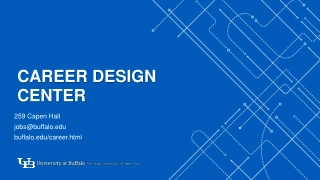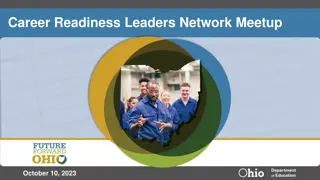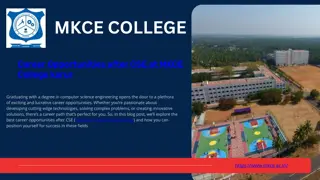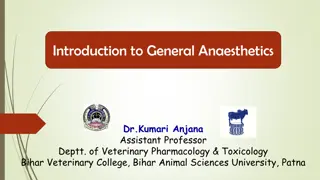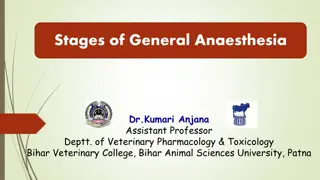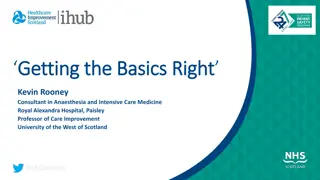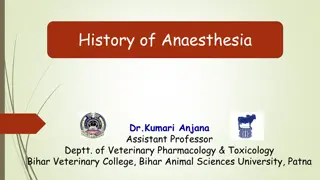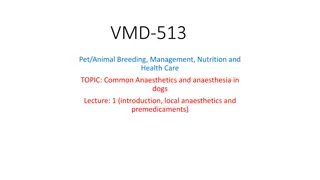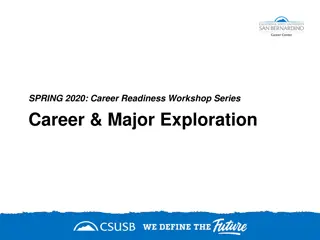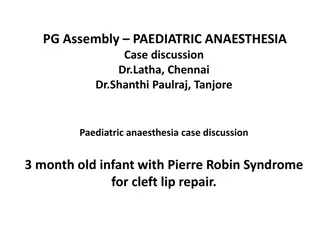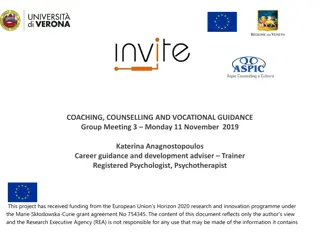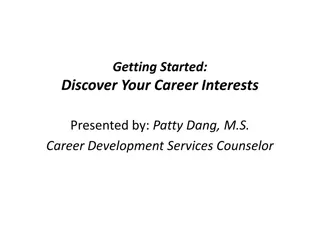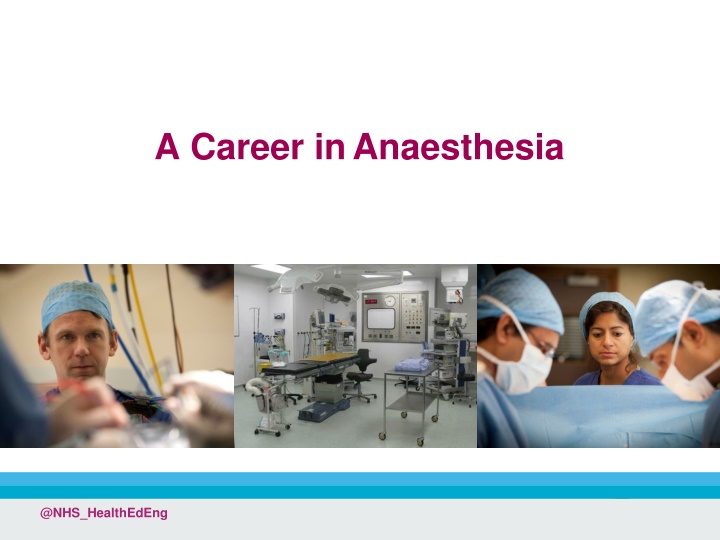
Exploring a Career in Anaesthesia at NHS HealthEdEng
Discover the world of anaesthesia with insights on career pathways, advantages, and subspecialty interests available to highly skilled anaesthetists. Learn about the equipment used, debunk myths, and explore opportunities in Intensive Care Medicine training. Get a glimpse into this vital medical specialty!
Download Presentation

Please find below an Image/Link to download the presentation.
The content on the website is provided AS IS for your information and personal use only. It may not be sold, licensed, or shared on other websites without obtaining consent from the author. If you encounter any issues during the download, it is possible that the publisher has removed the file from their server.
You are allowed to download the files provided on this website for personal or commercial use, subject to the condition that they are used lawfully. All files are the property of their respective owners.
The content on the website is provided AS IS for your information and personal use only. It may not be sold, licensed, or shared on other websites without obtaining consent from the author.
E N D
Presentation Transcript
A Career in Anaesthesia @NHS_HealthEdEng
Contents Anaesthesia Overview Advantages / Disadvantages Career Pathway Recruitment Competition ratios Commitment to Specialty Further Information (Please click on topic for direct link) @NHS_HealthEdEng
What is Anaesthesia? Going off to sleep By real doctors? Do you think he s a bit light doctor? @NHS_HealthEdEng
Anaesthetists Highly skilled doctors with > 7yrs PGT Single largest group of doctors in a hospital Variety of skills including: o Communication, airway, surgical, radiological Heavily involved in training both medical and non medical Look after healthy and the most sick patients in hospital Need: o Good medical and surgical knowledge o Excellent understanding of applied physiology and pharmacology Physiology in action ! o Understand basic physics! @NHS_HealthEdEng
Not Just General Patients! Subspecialty Interests Different surgical specialties Regional anaesthesia Day case Difficult airways Sedation Allergies Resuscitation Specialty Interests Pain management Intensive care medicine Obstetric anaesthesia Paediatric anaesthesia Pre-hospital care Preoperative clinics Teaching and training @NHS_HealthEdEng
Equipment We Use @NHS_HealthEdEng
Myths It is not boring there will be no time to do crosswords in theatre! Some days might be routine but you never know what is about to happen . The Anaesthetist is the unnoticed member of the Emergency Team. @NHS_HealthEdEng
Intensive Care Medicine ICM training starts at ST3 level. Entry is via either : Acute Care Common Stem Training (ACCS) Core Anaesthetic Training (CAT) Internal Medicine Training (IMT) Entrance to ST3 ICM is through competitive interview It is possible to train via either single or dual CCT route www.ficm.ac.uk/training-icm @NHS_HealthEdEng
Roles: Peri-operative Physician Pre operative care o Full assessment-Hx, exam, Inv. o Optimising Pt (Pre-op Clinics, not all on theday) o Discuss type of anaesthetic, risks, agreeplan Perioperative care o Induction o Remain vigilant to ever changing conditions, optimising physiology. o Emergence Postoperative care o Pain Management o Postoperative complications, Level 1 care @NHS_HealthEdEng
Typical Day Handover on Labour ward, including HDU Pre op assess elective C/S Anaesthetise C/S Spinals Pre op assess orthopaedic patients Orthopaedic list consisting of GA s and regionals (using U/S) Post op visit On call! 8:00am 8:30am 9:00am 12:30pm 1:30pm 5:00pm 5:30pm @NHS_HealthEdEng
Procedures Performed Canulation Intubation / LMA /iGel Fibre Optic Intubations Spinals Epidurals Regional block with U/S A lines / CVPline Cardiac optimisation equipment Hopefully not, but a possibility: Surgical airway CPR /ALS Pacing Chest drains Pericardiocentesis @NHS_HealthEdEng
Advantages & Disadvantages Long days Competitive Reduced patient contact (depending on which sub- speciality, many cases are awake!) Acute specialty Curing of Symptomatic Challenging Practical Varied Flexible work pattern Good work / life balance @NHS_HealthEdEng
Career Pathway Core training in anaesthesia is the doorway to a wide range of acute specialty care There are two routes of entry into anaesthesia o Core Training 3 years o ACCS (acute care common stem.) 4 years o6 months EM, 6 monthsAM, 30 monthsAnaesthesia, 6 months ICM Following Core training, there is competitive entry to an ST4 post for the remaining years of training to gain the Certificate of Completion of Training (CCT.) @NHS_HealthEdEng
Career Pathway Phases of training The training programme consists of three phases, which are:- o Stage 1: (Core three years or ACCS fouryears) o Stage 2 : ST4-5 (two years) o Stage 3 : ST 6-7 (two years) Dual CCT with both intensive care and anaesthesia is a possibility @NHS_HealthEdEng
Personal Qualities Self-reliance and the ability to assess the severity of life- threatening conditions, as well as initiating emergency treatment Understanding one s own limitations and the need to call for help, as well as having an attention to detail (especially with regard to monitoring and recordkeeping) Good communication skills with relatives and patients Good interpersonal skills to deal with all members of the theatre team (& surgeons!) In line with all specialties; trainees should be reliable, self-motivated, punctual, flexible and good team players @NHS_HealthEdEng
Personal Qualities Click link to view personal specification @NHS_HealthEdEng
Recruitment - Competition Ratio 2021 Competition Ratios @NHS_HealthEdEng
Recruitment The Anaesthetics National Recruitment Office at Health Education West Midlands is the responsible organisation for coordinating CT1 and ST4 recruitment to Anaesthetics specialty training posts (including ACCS Anaesthetics) within the NHS. This responsibility is carried out on behalf of the Royal College of Anaesthetists throughout Great Britain and Northern Ireland. Recruitment to anaesthetics training programmes is conducted twice-yearly for August and February commencement. http://anro.wm.hee.nhs.uk @NHS_HealthEdEng
Commitment to Specialty Tasters Life support courses Regional conferences: oMidland Society of Anaesthetists RCOA career day. Audit. Research / publications Teaching Medical student SSA / elective Logbook : Skills / procedures / interesting cases @NHS_HealthEdEng
Who is the Anaesthetist? Anaesthetists encounter a wide range of patients and specialties. We are one of the largest hospital departments and work in a variety of settings. Our core activity is providing anaesthesia for surgery butthis straddles ages and pathologies. It is a very different challenge to anaesthetise a healthy two-year old for day surgery compared with a frail elderly patient for an emergency laparotomy. We are evolving into peri-operative physicians, responsible for assessment and optimisation pre-operatively, ensuring optimal operative conditions and providing peri-operative support to surgicalteams. @NHS_HealthEdEng
Who is the Anaesthetist? Our training programme encourages anaesthetists to generate an in- depth understanding of basic science, physiology and pharmacology. We learn how to apply these principles to the broad landscape of clinical practice within the hospital, spanning medical and surgical specialities. This knowledge is married to the development of expert practical skills and a patient centred approach, allowing us tomanage the large spectrum of patients requiring anaesthetic services. In one day you may go from seeing outpatients in a chronic pain clinic to performing an awake fibreoptic intubation for impending airway compromise, or resuscitating patients with polytrauma in the emergency department @NHS_HealthEdEng
Where to go for more information Association ofAnaesthetists Royal College ofAnaesthetists NHS health careers Health Education England, East Midlands Health Education England, West Midlands @NHS_HealthEdEng


